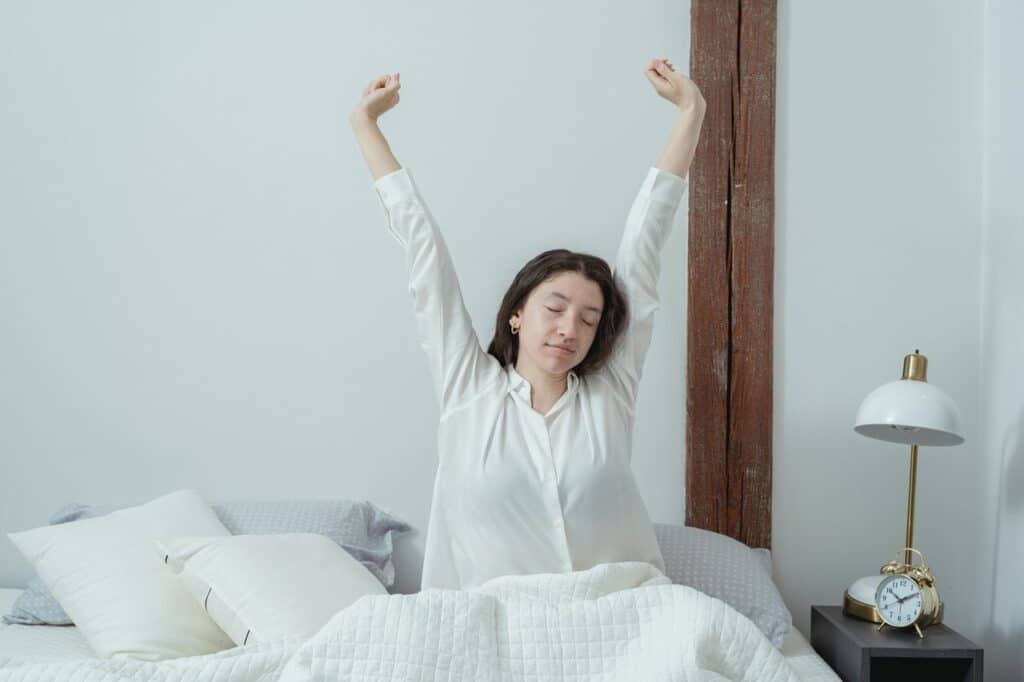How to Sleep Better, Sleep Longer and Feel Rested

With Sunny Raleigh, DO (aka, A Sleep Lover)
Dr. Sunny Raleigh appreciates sleep. “I love to sleep a lot. And I will fully admit, when I rest my head each night, I am so thankful for what is to come over several hours,” she says in this interview with Kimber Del Valle, PsyD, host of the podcast series, I Thought This Was Over.
As you will learn in this podcast, Dr. Raleigh’s training as a university soccer player and enduring the necessary but grueling years of medical residency, showed her just how much she appreciated sleep, especially when she could not get enough of it. Her need for sleep even influenced which medical specialty to choose when she completed her residency.
Today, her work in the functional and integrative medicine family practice at Restoration Healthcare was the perfect choice to help others better understand how to get better sleep, reduce stress and allow the body to relax and rejuvenate. It’s a topic she addresses first thing with all her patients, no matter their age.
Tips for Better Sleep
The following are excerpted highlights of this podcast interview. We encourage you to listen to the entire podcast to learn all of Dr. Raleigh’s sleep tips and take notes to learn more.
- Sleep is the time when our bodies restore and detoxify. “If you are allowing that process to unfold in full Majesty, you will then be cleaning up those, you know, microglial cells during that sleep detox process. That’s a huge starting point. While are we sleeping, we are doing some of our best work,” she says.
- Above all, Dr. Raleigh says that the time before bedtime is “the transition time leading up to the time your head actually hits the pillow can’t be emphasized enough.” It’s difficult to turn off the day. Night time is not the time to have difficult conversations, check one’s bank account or any other trigger that alerts the brain to stay awake. “This transition into that softer, calmer time” is important she says.
- Dr. Raleigh emphasizes using evening time to “consciously down-regulate cortisol” that builds up during the day. This can be something as basic as routines of washing dishes by hand in warm soapy water, actively sweeping the floor with a broom, preparing a healthy meal, folding clothes, taking a walk with a significant other or a gentle bike ride after dinner with the kids. And of course, mindfulness practices like yoga, meditation, and alternate nostril breathing are part of this down-regulation process. Each one of these activities takes the mind away from the stressors of daily life.
- Both sleep and healthy eating restore the immune system. Dr. Raleigh gives her school-age patients a color-coded sheet that encourages eating two or more servings of fruits and vegetables per day.
- Bedtime routines are equally important, she reminds listeners. Her recipe for a deep soak is dissolving two cups of Epsom salts, half a cup of sodium bicarbonate and 10 lavender drops into a bath. “And I have so many kiddos that I start that off with this early in their life. Fast forward four-or-five years, and now they’re 10-12 years old. And they use bath time as their way to regulate their nervous system. It’s our job as adults and parents to set the tone. … We do it best by showing them how,” she says.
- No matter one’s age, Dr. Raleigh says reading an actual book (not a phone or tablet), helps the brain prepare for sleep.
- In this podcast, Dr. Raleigh and Dr. Kimber, discuss how electronics interfere with one’s ability to sleep. “We’re in the age where we have constant stimulation, and it is our job to set up those boundaries to say thanks, but no mas. ‘This is my protected time so put that phone in airplane mode several hours before bed because a lot of people are just a moth to the flame,” she says. Listen to the podcast to learn more about how to reduce exposure to electronic magnetic fields (EMS).
- What about herbal teas, dietary supplements like melatonin, CBD or even over-the-counter or prescription sleep aids. “Always paying attention to what medications and substances you put into your body, especially closer to bedtime, absolutely matters,” she explains. Dr. Raleigh has answers for all of these sleep aids. She also discusses how anxiety, trauma and PTSD, as well as how menopause, acid reflux and urinary troubles can interfere with sleep. She reviews the benefits and warnings of various sleep aids, as well as how America’s most popular drug, caffeine, interferes with getting a good night’s sleep.
- Better sleep happens with baby steps, says Dr. Raleigh. “We are all a work in progress,” she reminds us.
- Lastly, the way we wake is also important to one’s health. Morning routines and the first 30 minutes of the day “kick-starts” the body and sets one’s intentions for the rest of the day, she says. “Whether it’s just getting out of bed and doing some cat-cow, yoga poses, maybe doing a downward dog, and getting some flow of that oxygen to those vital organs to that brain to wake us up a bit. Some people need a brisk walk in the cool air. Others need to get straight to the peloton,” says Dr. Raleigh.
For more tips from Dr. Raleigh on sleep, see this article, Looking for Ways to Become Healthier? Sleep on It!


